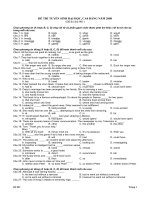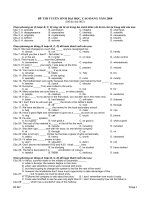nguphap tieng anh
Bạn đang xem bản rút gọn của tài liệu. Xem và tải ngay bản đầy đủ của tài liệu tại đây (103.12 KB, 13 trang )
Câu phức hợp - The complex sentences
I. Mệnh đề phụ tính ngữ (Mệnh đề quan hệ – Relative clause)
• Mệnh để phụ tính ngữ mang chức năng như một tính từ , đi sau và bổ nghĩa cho danh từ trước nó.
• Mệnh đề tính ngữ được bắt đầu bằng các đại từ quan hệ như là “who” ,”what” ,”which”, “that”,”whom” ,”whose”
và các trạng từ quan hệ như “when”, “where”.
Eg; The man is my teacher. He came here yesterday = The man who came here yesterday is my teacher.
1. Mệnh đề phụ tính ngữ bắt đầu bằng “who”
-Được dùng sau danh từ chỉ người.
a.Đại từ quan hệ “who” làm chức năng subject.
Eg : The woman who looked after me is a nurse.
The man who is standing overthere is my teacher.
-Động từ được chia trong mệnh để quan hệ phải chia phù hợp với chủ ngủ trong mệnh đề chính.
b.Đại từ quan hệ làm chức năng object.
Eg :This is the accountant who you recommended tô mẻ.
Có thể lược bỏ đại từ quan hệ làm chức năng tân ng .
2. MDQH bắt đầu bằng “which”.
-Được dùng sau danh từ chỉ người hoặc sự vật và tuân theo các nguyên tắc đối với MDQH bắt đầu bằng “who”.
3. MDQH bắt đầu bằng “whom”.
-Đại từ quan hệ “whom” đứng sau danh từ chỉ người nhưng chỉ khi nó làm chức năng tân ngữ của câu.
Eg : The man who I told you about yesterday is my neighbour = The man whom I told you about yesterday is my
neighbour = The man about whom I told you about yesterday is my neighbour.
( Vi ta đặt giới từ lên trước đại từ quan hệ nên ta ko thể bỏ đại từ quan hệ “whom” được).
4.Mệnh để quan hệ bắt đầu bằng “whose”
-MDQH bắt đầu bằng “whose” theo sau và bổ ngữ cho 1 danh từ chỉ người.MD này xác định sở hữu cho 1 danh từ trog
MDQH nên theo sau đại từ “whose” cũng là một danh từ.
Eg :Yesterday, I met then girl whose father is my boss.
+Note : Khi vế thứ 2 biểu thị mối quan hệ cho sở hữu cho 1 danh từ chỉ vật thì ta dùng Noun+ of which.
-Lưu ý là trong văn nói ta vẫn có thể dùng liên từ Whose.
Eg:The house, garden of which has many kinds of flowers,has been sold.
5.Mệnh để quan hệ bắt đầu bằng “where”.
-MDQH bắt đầu bằng “where” dùng để nói về địa điểm nên nó dùng để thay thế cho các trạng tự như là here,there hoặc
các trang tư bắt đầu bằng in the,at the.Vì vậy danh từ đứng trước là 1 danh từ chỉ nơi chốn,địa điểm.
Eg.The hotel where we stayed during our vacation was not very clean.
6.Mệnh đề quan hệ bắt dậy bằng “when”.
-Trạng từ “when” dùng trong mệnh đề quan hệ như 1 trạng ngu chỉ thời gian nên khi kết hợp câu,nó thường thay thế cho
trạng từ chỉ thời gian như “then”,“at that time” và danh từ đứng trước nó thường là 1 danh từ chỉ thời gian như the
day,the month,the year.
7.Mệnh để phụ tính ngữ không hạn định (Non – defining relative clause).
Eg:The travellers who knew about the floods took another road.
The travellers , who knew about the floods , took another road.
Nếu ở ví dụ thứ 2,người viết nhấn mạnh rằng all the travelers đã biết về floods và quyết định took another road.Ở ví dụ
thứ 1, người viết chỉ hạn định rằng những traveler đã biết về floods và họ đã chọn con đường khác và sẽ có những
travelers ko biết về flood và vẫn đi con đường đó.
Note :
Cấu trúc : It + be + noun /pronoun + defining relative clause (who /that).
Eg : It is Enghlish that we want to study in ESE.
It is Mrs Thatcher who is knows ad a iron lady.
-Mệnh đề không hạn định thường đi sau và bổ nghĩa cho 1 danh từ là tên riêng của người hoặc vật hoặc 1 cụm danh từ
đã được xác định đầy đủ về nghĩa.
-Mệnh để không hạn đinh chỉ bổ sung thêm thông tin cho danh từ đứng trước nó.Nếu bỏ mệnh đề này đi thì câu hoàn
toàn đủ nghĩa.
-Ta không bao giờ được dùng “that” trong mệnh đề này và việc dù dùng đại từ quan hệ fai tuân theo đúng chức năng
của nó.
Structure:N (nguoi) w
N (vat) which
N (người làm chức năng tân ngữ) who
Eg : Peter , who had been driving all day , suggested stopping at the next town.
= Peter had been driving all day and he suggested stopping at the next town.
Note;Việc biểu hiện số lượng trong mệnh để phụ tính ngữ.
(some of,any of,most of,none of,two of ,half of , a few of ,..).
-Những đại từ chỉ số lượng trên luôn đi trước đại từ quan hệ whom /which.
Eg :
In my class,there are 20 students,most of whom are from Ha Noi.
=In my class,there are 20 students.Most of them are from Ha Noi.
II . Mệnh để trạng ngữ (Adverb clauses)
1.Mệnh để trạng ngữ chỉ thời gian (Adverb clause of time)
-Mệnh để trang ngữ chỉ thời gian thường được bắt đầu bằng những liên từ chỉ thời gian
như:when,while,since,as,after,as soon as,before,till,until,by the time,whenever,just as…
-Một số trường hợp về cách dùng thời trong mệnh đề chỉ thời gian :
a. Hai mệnh để quá khứ đơn:as,when,just as,as soon as diễn tả hành động xảy ra nối tiếp nhau hoặc kể lại một chuỗi
hành động trong quá khứ.
Eg:As soon as we arrived in train station,the train left.
When we last saw him,he looked very pale.
b. Mệnh để quá khứ đơn,quá khứ hoàn thành :1 hành động xảy ra trước một hành động khác :before,after,by the
time,tll,until.
Eg : When we arrived at the train station , the train had left .
By the time we got home , eveybody had had dinner.
-Liên từ by the time chỉ đứng trước mệnh để chia ở thời quá khứ đó
c. Mệnh để quá khứ đơn – hiện tại hoàn thành /hiện tại hoàn thành tiếp diễn : since , ever since .
I have worked here since /ever since I graduated.
= I have been working here since /ever since I graduated.
d .Mệnh đề hiện tại đơn – tương lại đơn : when , until , till , before , after , as soon as : diễn ra hành động xảy ra trong
tương lai.
We will wait for him here until he gets back.
d. Quá khứ đơn – Quá khứ tiếp diễn ; When , while : hành động đang xảy ra , hành động khác xen vào.
Eg : When he came , he was talking on the phone .
e.Hai mệnh đề cùng hiện tại tiếp diễn , quá khứ tiếp diễn : while .
Eg : While the teacher (explain) the sum on the black board , the children (throw) the paper aeroplane around the
classroom.
f. Hiện tại đơn – tương lai hoàn thành: before , by the time.
Eg:By the time I graduate , I will have lived in HN for 5 years.
Note:Một số liên kết của mệnh để trạng ngữ chỉ thời gian:
Hardly…when…
No sooner…than…
Scarcely…when…
(vừa mới…thì…)
S+had +hardly/no sooner/scarcely+p2 ,when /than /when+clause chia ở simple past.
The performance had hardly /scarcely started when the light went out.
=The performance had no sooner started than the light went out.
Exercise 3ut the verbs in brackets in suitable teneses.
I must admit that Mary’s Enghlish (improve) everyday . Three weeks ago , she (manage) to book us on to the Portsmouth
to Santander ferry at the local travel agent.
(is improving) (managed)
The night before we (be) due to leave , she (ring) me up and to remind me to be on time . “don’t for get the train (leave)
at 7.35 and if we (miss) that,we (miss) the ferry ,too”,she said.
(were),(rang),(leaves),(miss),(will miss) “of course I (get) there on time” I replied.“you are the one who (always turn up)
late for things.
will get ,is always turing up
Surprisingly,we both (arrive) at the statition in time (catch) the train.We (sit) on the train for about ten minutes when we
realised,to our horror that it (go) in the wrong direction.We got off at the next station where a ticket seller informed us that
there (not be) another train to Portsmouth until 8 .45 .We explained that we had to catch the ferry at 10 o’clock . “Well , If
I (tobe) you , he said,I (catch) the coach.That should get you to Portsmouth before the ferry (sail).But you (have) to
hurry,it (leave) the bus station in about five minutes .
arrived , to catch , had been sitting /had sat , was going , wouldn’t , were , would catch , sails , have , is going to leave /is
leaving
-We shot off like lightning despite the heavy rucksacks on our backs and jumped on the coach just as the driver (shut)
the doors .We (collapse) in our seats with a sigh of relief , and the driver announced “sorry everyone but the motorway
(still repair), so we will not get to Portsmouth until 9 .45.
-Shut , collapsed , is being repaired /has been being repaired.
We groaned in despair . That gave us only fifteen minutes to get the ferry terminal.
We arrived at Portsmouth bus station at 9 .40 and jumped straight in tờ a taxi.
“the Santander ferry terminal and please hurry !” . I shouted “or,it (go) before we (get) there”.
will go , get
-To our astonishment , the taxi driver camly switched off the engine and turn round . “ You (not hear)? , he said , smiling
“the ferry workers (come out) on strike last night .
Haven’t you heard ?, came out,in order to + Verb
so as to + Verb
in order not to + Verb
so as not to + Verb
in order to:Ý muốn diễn đạt chủ thể muốn thực hiện hành động này hoặc muốn sự việc đó xảy ra.
so as to:Ý muốn nói rằng chủ thể muốn sự việc đó xảy ra
in order to được dùng rộng rãi hơn.
Eg:Cô ấy học đánh máy để giúp đỡ chồng cô ấy=She is learning typing in order to/so as to help her husband.
Cô ấy nói rằng quá sớm để có nhiều thời gian hơn cho bọn trẻ của cô ấy!=She left work early in order/ so as to have
more time with her children.
Để không đánh thức đứa bé đấy người mẹ đã rời đi một cách lặng lẽ=In order/So as not to wake the baby up, the
mother left quitely.
Anh ta phải cố gắng hết sức để theo kịp các bạn trong lớp = He has to try his best in order / so as to catch up with his
classmates.
Note: in order to (không phải là so as to) được dùng để nhấn mạnh rằng chủ thể thực sự có ý muốn thực hiện việc này
hoặc mong muốn sự việc xảy ra.
Eg: He bought diamonds when he was in Amsterdam.That was not surprising. He went to Amsterdam in order to buy
diamonds.
He came to Thailand in order to cheer Vietnamese football team.
b. Infinitve clause
Structure: so that/in order that + Clause (S+ Verb)
Mệnh đề theo sau “so that”, “in order that” thường chứa các động từ will/would, can/could +Verb.
Eg: She lent me her money so that /in order that we could buy a house.
We plant alot of trees so that/in order that our garden is improved.
2. Mệnh đề trạng ngữ chỉ nguyên nhân và hệ quả (Adv clause of cause and effect).
Mệnh đề trạng ngữ chỉ nguyên nhân thường được bắt đầu bởi các liên từ như: since, as, long as, now that, as/so long
as, in as much as, because.
Eg: Because he was sleepy, he went to bed (đều mang nghĩa “bởi vì”)
Since he is not interested in classical music, he decised not to go the concert.
Note 1: Mệnh đề now that chỉ được sử dụng ở tình huống hiện tại hoặc tương lai.
Note 2: Để chỉ nguyên nhân, hệ quả, ta có thể dùng:
Due to/ Because of / Owing to + Noun/ Noun Phrase/ Ving.
Eg: Because of cold weather, we must stay at home.
Mệnh đề trạng ngữ chỉ hệ quả thường được bắt đầu bằng liên từ “so”.
Eg: She did not study hard, so, she failed the exam.
Note: Ta có thể dùng các linking verb để nói về hậu quả và các từ này thường đứng ở đầu câu thứ 2 như: therefore,
consequently, as a result +Clause
Eg: She did not study hard. So/Therefore/ Consequently/ As a result, she failed the exam=She did not study hard. She
failed the exam, therefore.
Ex. Correct any illogical linking devices in the following sentences.
1 Although he’d never tried it before, he was very good at it.
-->
2 Dont forget to phone us finally you get there
--> (as soon as, once, when)
3 Despite being an accomplished musician, she is also a first-rade painter.
--> As well as, In addition to,
4 As well as the bad weather, the race meeting has been cancelled.
--> Owing to, due to, because of
5 I hope to get some work done while the holiday.
--> during
6 So that you are always borrowing a pen, I’ve decided to buy you a new one.
-->Since, because
8 I put the vases on top of the piano since they wouldn’t get broken.
-->So that
9 While a little sunshine can be good for you, too much can be very harmful.
-->ok
Ex. Complete these sentences with suitable linking devices.
2 They got to the shop at 6 a.m ... they would be able to get the best bargains in the sales.
-->So that/in order that.
3 You’d better to get the cheque book with you ... it costs more than you expect.
-->In case
4 The apple crop this year has been terrible ... the unseasona frosts we had in May.
-->Dute to, owing to, because of
5 ... there was a train strike, we had to spend an extra 2 day in Toronto.
-->As, since, because
6 The man was... rude ... the manager had to ask him to leave the restaurant.
-->So...that..
7 He did not get to bed unitl 5 a.m ..., he is feeling exhausted this morning.
-->so
8 Erica’s new boss turned out to be ... a tyrant ... she resigned after a week.
-->Such...that...
10 ... you arrive in Bombay, give us a call to let us know everything.
-->As soon as, when, Once
11 We won’t be able to forward the goods ... we receive the cheque.
-->Until, till
15 ... Steve was upstairs having a shower, the burgulars were downstairs helping them seleves to his stereo, computer
and TV.
-->While
13 ... had I dropped off to sleep, ... next door’s dog started howling at the moon.
-->Hardly...when









